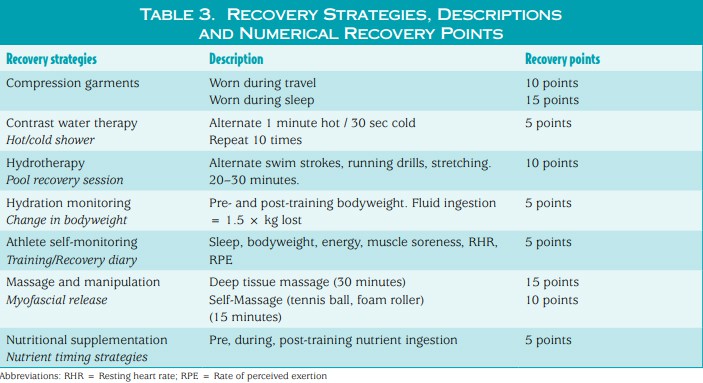Athletic performance is not just about physical training and conditioning. It also involves taking care of your mental and emotional well-being. Recovery is an essential part of any athlete’s training regimen, and aiming for ‘100 points of recovery’ after each training session can help improve your next and continued athletic performance.
What are 100 points of recovery? 100 points of recovery refers to accumulating at least 100 points of relaxation, rest, diet, hydration, or active recovery strategies such as pool recovery sessions, with each different recovery strategy contributing a certain number of points to your total. See below table.
(Table by Stephen P. Bird, Charles Sturt University. Journal of Injury Prevention & Performance Enhancement)

The benefits of 100 points of recovery for athletic performance:
- Improved Physical Recovery: Rest is crucial for physical recovery, especially after intense training sessions. Rest allows the body to repair and rebuild muscles, leading to improved performance and reduced risk of injury.
- Reduced Muscle Soreness: Adequate rest and recovery can help reduce muscle soreness and inflammation. By taking breaks throughout the day, getting enough sleep, adequate nutrition etc. athletes can reduce muscle soreness and recover faster.
- Better Mental Health: Athletes are under constant pressure to perform at their best, which can take a toll on their mental health. Rest and relaxation can help reduce stress and anxiety, leading to better mental health and improved athletic performance.
- Increased Focus and Concentration: Taking breaks and getting enough rest can help improve focus and concentration, leading to better performance on the field or court, such as improved decision making
- Enhanced Immune Function: Adequate rest and recovery can also help improve immune function, reducing the risk of illness and injury.
How athletes can achieve 100 points of recovery (see table for more ideas!)
- Schedule regular rest and recovery periods throughout the day, such as taking a 30-minute nap or practicing mindfulness meditation.
- Prioritise sleep and aim to get at least 7-8 hours of sleep each night. Minimising time on your phone ~45 minutes before you go to bed, sleeping in a cooler room, and avoiding sugary or caffeinated drinks can all help in facilitating good sleep hygiene.
- Take at least one full rest day each week to allow the body to fully recover.
- Incorporate low-intensity activities such as yoga, walking or hydrotherapy (pool walking) into your training regimen to promote relaxation and recovery.
- Practice stress-management techniques such as deep breathing or visualisation to reduce stress and anxiety.
- Make sure to eat meals high in protein for muscle growth and repair, and meals with carbohydrates to replenish energy stores, ready for the next training session or game.
Recovery is a critical component of athletic performance, and aiming for 100 points of recovery each week can help athletes improve their physical and mental well-being, leading to better performance on the field. By prioritising rest and relaxation, athletes can achieve their goals and perform at their best standard.
References:
- Budgett R. Fatigue and underperformance in athletes: the overtraining syndrome. Br J Sports Med. 1998 Jun;32(2):107-10. doi: 10.1136/bjsm.32.2.107. PMID: 9631215; PMCID: PMC1756078.
- Good sleep hygiene strategies; (Adapted from S.L. Halson European Journal of Sport Science, March 2008; 8(2): 119-126)
